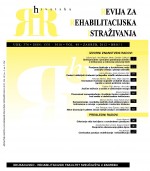JEZIČNE TEŠKOĆE U OSOBA S OŠTEĆENJEM MOZGA
LANGUAGE IMPAIRMENT IN PERSONS WITH BRAIN DAMAGE
Author(s): Tatjana Prizl Jakovac, Ana Leko KrhenSubject(s): Education, Language acquisition, Health and medicine and law
Published by: Sveučilište u Zagrebu, Edukacijsko-rehabilitacijski fakultet
Keywords: traumatic brain injury; stroke; communication disorders; aphasia;
Summary/Abstract: The study was conducted to test understanding and naming of people with traumatic brain damage and stroke. Assignments for testing comprehension of words (synonyms and prepositions) and sentences are taken and adapted from "Psycholinguistic Assessments of Language Processing in Aphasia” (Palpa, Kay et al., 1992). The survey included ten examinees. The type and degree of expressed linguistically speaking difficulties are not taken as a criterion. In both groups were three men and two women, aged 18-66 years. Guided by the assumption that people with communication disorders caused by traumatic brain damage have pragmatic problems, while stroke results with aphasia related to the linguistic difficulties, we expected the differences that are not confirmed by statistical analysis. Expected differences in faster language recovery, as well as progress in speech and language therapy, haven’t shown any statistical significance between patients with different causes of brain damage. Both groups showed significant improvement in final testing, after completion of therapy. Although traumatic brain injury causes communication disorders and language problems, which are different from the person with aphasia, in the early stages of rehabilitation, they have many similarities what is the reason for precise diagnostic assessment for clinical treatment.
Journal: Hrvatska revija za rehabilitacijska istraživanja
- Issue Year: 48/2012
- Issue No: 1
- Page Range: 55-63
- Page Count: 9
- Language: Croatian

